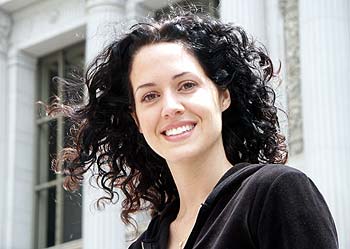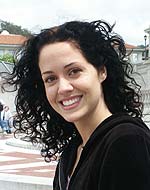 |
Sara Davis-Eisenman, who graduated in December 2002, was shortlisted for the University Medal. (BAP photos) |
Believing in yourself may offer hidden powers, says Sara Davis-Eisenman — and she's living proof
BERKELEY - For years Sara Davis-Eisenman thought higher education would never be part of her future. "Because my family’s financial situation was so dire, I had this implicit belief that college was only for other people," she recalls. Yet not only did Davis-Eisenman graduate in December 2002 from UC Berkeley with high honors in cognitive science and Phi Beta Kappa, but she also very nearly won the University Medal, the top accolade for a graduating senior.
For Davis-Eisenman, who grew up with parents both plagued by mental illness, the journey represents a triumph of mind over matter. "I was able to overcome a lot of things because I believed I could," she says.
It might sound like a pop song, but for Davis-Eisenman this philosophy has become her career path. She plans to enter graduate school next year in either neurobiology or public affairs: the first to continue studying the power of mental techniques to treat various disorders; the second, to apply cognitive theory to international problems such as conflict resolution, resource management and ecological sustainability.
A difficult childhood
Although she hasn't yet settled on which interests her more, both paths originate from her past. Her father, who suffers from debilitating schizophrenia, and her mother, who has bipolar disorder, met while they were both in a mental-health institution. Neither was ever in control of their illnesses long enough to go to college, hold down jobs for long, or serve as reliable, functioning parents to Davis-Eisenman and her two much-older sisters.
University Medal coverage Full graduation coverage: |
Davis-Eisenman and her mother lived hand-to mouth for most of her childhood, before her mother’s deteriorating health sent the 10-year-old into the Iowa foster care system for a year. At 11, she moved to California to live with her older sister.
Davis-Eisenman describes her harrowing childhood with remarkable equanimity and lack of rancor. "My mom is still my mom, she is just a very complex person," she says. "My childhood gave me a lot of gifts as well as adversity."
The biggest gift was the haven of learning. Throughout all the turmoil at home, Davis-Eisenman immersed herself in science, art, and literature. "School was what kept me interested in life, rather than the other way around," she explains. "My intellectual interests became my lifestyle, in a way."
And although she moved schools frequently, attending six before she graduated from high school, she was lucky enough to meet teachers who encouraged her. "In sixth grade, just before I moved from Iowa, my teacher told me that I was a natural leader and I should never forget it," she recalls. "I didn't. That meant so much to me, that someone could believe in me. It still does."
Davis-Eisenman did not even consider college immediately after high school. She was struggling too hard to support herself and help her parents. For five years, she worked a variety of jobs, including as a programmer (self-taught) for an advertising agency by day while waitressing at night. Then a coworker suggested she apply to college, and told her about the financial aid that might be available. After much self-doubt, Davis-Eisenman was persuaded to give it a go. "It was like a door swung open for me at that moment," she says, "And I knew that I had to go for it."
"The application process was very emotional for me, just the idea that I was trying to do this," she recalls. Shortly after she got married - to high-school friend and Cal alum Hanan Eisenman (English and history) - she learned she had been accepted to UC Berkeley. She was at once terrified and elated. "I came home and told my husband, 'I hope I’m smart enough,'" she says.
Adventures in the desert
At UC Berkeley, she quickly proved her doubts unfounded, gaining in confidence with each semester. (By the time she graduated, she had racked up 15 A+'s in a diverse range of subjects and a cumulative GPA of 3.99.) She started out studying astronomy, doing field work at the Lick Observatory and taking physics classes in string theory, while taking as many art classes as she could fit in around her job at the Pacific Film Archive. Wanting to help youths who might feel as disadvantaged as she had, Davis-Eisenman volunteered as a tutor at the Samaritan Neighborhood Center in inner-city Oakland.
 'If someone throws an adventure at you, you don't say no.' -Sara Davis-Eisenman
|
In the summer of 2001, Davis-Eisenman and her husband got the chance of a lifetime when his father, a noted Dead Sea Scrolls scholar and professor of Middle East Religions at Cal State University, Long Beach, asked them to take his place on an archaeological dig in Qumran, near the Dead Sea. Digging from 4 a.m. to noon to avoid the scorching heat, she and Hanan worked on a team that excavated unexplored tombs and caves around the site of the Dead Sea Scrolls. Their discovery of an important tomb dating from the 1st century CE was written up in Time, the Jerusalem Post, and biblical journals.
Didn't Davis-Eisenman feel a little out of her depth accepting such an assignment? "A little, but if someone throws an adventure at you, you don't say no," she says.
Meanwhile, her path of study at UC Berkeley was taking an unexpected turn. "I had wanted to study cosmology to understand the fabric of the universe," she says. "Then I realized that my interest in astronomy was more a love of the philosophy than the equations. I was gravitating to the problem of consciousness as a physical problem."
Not sure what major that would fall into, she sat down with her dog-eared copy of the course catalog in which she had circled the hundred or so classes that interested her. She counted how many courses she had circled for each major. Cognitive science was the winner.
"In part, I was drawn to cognitive science to learn more about the illnesses that affect my parents and so many others," Davis-Eisenman wrote in her University Medal essay. "But I was equally compelled to explore how the unique powers of neuroscience, psychology, and philosophy could be integrated to shed light on the most fundamental aspects of human nature and the essential mystery of consciousness."
I think, therefore I act
Working with UC Berkeley professor John Searle, a legend in the philosophy of the mind and language, Davis-Eisenman researched and wrote what Searle calls "an absolutely superb honors thesis" titled "A Neuroscientific Inquiry into the Free Will Problem."
The subject of her thesis is enough to make a layperson's head ache. "In science, there's the basic idea that the physical realm is governed by deterministic causation. Put simply, it's billiard-ball causation: one ball hits a second ball, and the second ball reacts in a predictable way," she attempts to explain. "But with humans, the situation is more complicated because we don't feel 'determined' at all. In many cases we feel that, given the exact same set of causes, we can choose to act in one of several — even infinitely many — ways.
Since by definition our actions can't be both determined and free, in Davis-Eisenman's thesis she argues that while compelling evidence suggests that our actions are determined, our experience of free will may be essential to our functioning. The feeling that we have choices causes us to engage in mental rehearsal as we deliberate our options. But, Davis-Eisenman found, neuroscience indicates that mental rehearsal itself has causal efficacy: for example, studies have shown that when basketball players imagine that they're successfully sinking free throws, their accuracy improves significantly. "So through the process of deliberation, people are rearranging their biochemistry," she marvels.
She is also interested in the "placebo effect," or why people who believe they are taking medication instead of just a sugar pill often show significant improvement over those who are taking no medication at all. Davis-Eisenman thinks that further research into the placebo effect just might reveal some hidden powers of the mind - and with them, better ways to treat mental illness.
"On some level, we know that mental disorders must be realized physically," she says. "And the pharmaceutical companies have jumped on that with medications, treating the symptoms but not the cause. But what if meditation and other mental disciplines can help people rewire their brains? In my lifetime, I think the gap between the mental and the physical is going to close, and I want to use that knowledge to help people."
Ultimately, Davis-Eisenman seeks a better understanding of how the human mind works, both to help people like her parents function better in society, and to help society function better as a whole. "If we can figure out how human judgment and decision making works, maybe we can curb our more destructive tendencies, and stop injuring each other and the planet," she says.
Her goals are lofty ones. At the moment, a few months after graduation, Davis-Eisenman is taking it easy - writing, painting, and dancing while she looks for a job as a break before graduate school. "I'm being picky," she laughs. "It's the wrong job market to be picky in, but I don't want to do just anything."
One thing's for sure: Davis-Eisenman has proved she can do whatever she sets her mind to.

